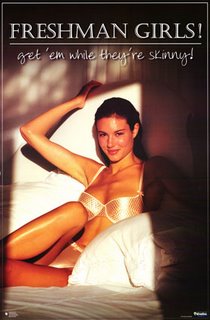STEVE TAYLOR (AND TURNER) & COLLEGE TRANSITION
 Today I arrived at my desk to find a print out of lyrics of a song by Steve Taylor. One of my co-workers must have thought that the lyrics were germane to my work on college transition. The song comes from Taylor’s 1987 album, I Predict, and is entitled, “Since I Gave Up Hope I Feel A Lot Better.”
Today I arrived at my desk to find a print out of lyrics of a song by Steve Taylor. One of my co-workers must have thought that the lyrics were germane to my work on college transition. The song comes from Taylor’s 1987 album, I Predict, and is entitled, “Since I Gave Up Hope I Feel A Lot Better.”(It immediately reminded of Steve Turner’s important poem, “Creed.” You can read it and re-read it here. Enjoy!)
Commenting on his song, Taylor suggests that it is “a rather satirical song (something of a departure for me, don't you think?), this one takes a look through the wide eyes of a college freshman at existentialism and nihilism, the philosophies that fuel much of contemporary American thought.”
Here are the lyrics… something to ponder over the weekend:
Enter the young idealist
chasing dragons to slay
exit the hustler
packing up his M.B.A.
Freshmen scream in a classroom
was there a sound?
first degree in the vacuum
I'm on college ground
Took a class
big fun
modern ethics 101
first day learn why
ethics really don't apply
Prof says, "One trait
takes us to a higher state
drug free, pure bliss
get your pencils, copy this:
"Life unwinds like a cheap sweater
but since I gave up hope I feel a lot better
and the truth gets blurred like a wet letter
but since I gave up hope I feel a lot better"
Top of the class sits Ernest
he was brightest and best
till the professor lured him
to the hopeless nest
Now he lives for the shortcut
like a citizen should
tells the class with a wink
"only the young die good."
He says, "Ideals? Uncouth.
fatalism needs youth
eat well, floss right
keep the hungry out of sight
save face--nip and tuck
praise yourself and pass the buck
don't forget the best advice
everybody's got a price
"Life unwinds like a cheap sweater
but since I gave up hope I feel a lot better
and the truth gets blurred like a wet letter
but since I gave up hope I feel a lot better
"While the world winds down to a final prayer
nothing soothes quicker than complete despair
I predict by dinner I won't even care
since I gave up hope I feel a lot better"
Nazis plead in a courtroom
"Pardon me, boys"
profits fall in a boardroom
did they make a noise?
Someone spreads an affliction
company's nice
someone sells an addiction
puts your soul on ice
Half wits knock heads
candidates in double beds
good guys defect
"I can't precisely recollect"
teacher's pet theory's fine
if you're born without a spine
can't you spell wrong?
sing it to him Papa John




